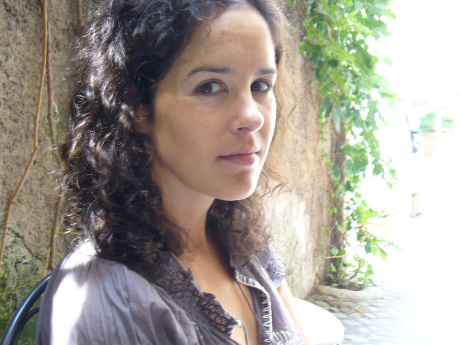New American Poets
New American Poets: Cecily Parks

I Lost My Horse
I was looking for an animal, calf or lamb,
in the wire, metal and hair along the fence line.
Wire, metal and hair and there, in the gully, a man
I was pretending was dead. I pretended
to leave him where the woods met the meadow,
walking fast because I'd left my horse lashed
to a fence I lost track of two valleys
ago. Like a horse, I shied from the dead.
Here, calf. Here, lamb. I listened, wanting
(without my horse, my calf or lamb) to be
whipsmart rather than wanted. I wore orange
on antelope season's first afternoon
and waited for the click that means the safety is
off. When I spoke, my story was about picking
skulls clean. I wanted everything to be
afraid of me, the horseless girl who wanted
to kill a dead man again. The white bed
with a window behind its headboard became
ice on the meadow road and a tree to stop
a truck dead. I meant to trace my boot steps
back to the fence where things went wrong,
find my horse mouthing the bit, tied up by her
reins. I looked for the horse because she looked
safe enough to love. I looked for the calf
or lamb because there was no calf or lamb.
The man left before I could leave him, and I pretended
the world was afraid of me because I was alone.
Poem copyright © Cecily Parks. All rights reserved. Reprinted with the permission of the author.
When did you set your foot on the path of poetry? Did you feel a sudden bolt? Or did you grow gradually more passionate about poetry?
I took fiction workshops in college and wrote a lot of thinly-veiled autobiography that I called fiction. My senior year, I needed another English class to fill my fall semester schedule, and I took the school's only poetry workshop. When I wrote my first poem for that class, I felt a charge. Poetry allowed me to do wilder things with language and, most thrillingly, to write about subjects other than myself.
Is there a collaborative element to your writing process and what do you think it is?
I collaborate with whatever I happen to be reading around the time of writing.
Do think that poetry can have an effect on everyday speech? How?
In the beginning of Literary Theory: An Introduction, Terry Eagleton imagines a speaker approaching him at a bus stop to softly murmur, "Thou still unravished bride of quietness." Were someone to approach me in such a way, I wonder if I would turn or if I would run. Poetry's capacity to astonish, unsettle, and command attention could teach everyday speech to aspire to the same.
Did you start off with an idea that your book grew around? Did you move away from that idea as the book progressed?
Every time I began to formulate an idea of how my book would look, or the arc it might inhabit—in fact, any time I had any inklings of its existence at all—I found myself unable to follow through with said idea. So I kept writing poems that inhabited Western, imaginative, and lovelorn landscapes in one way or another. Most of them found their way into my collection Field Folly Snow.
Do you think that your poetry or poetry in general speaks to spiritual or religious yearnings and struggles? If so, how?
I believe that my poems operate on an energetic plane that is perhaps best described as parallel to that of prayer. To write poetry, I have to imagine an interlocutor, even if he/she never responds to me.


